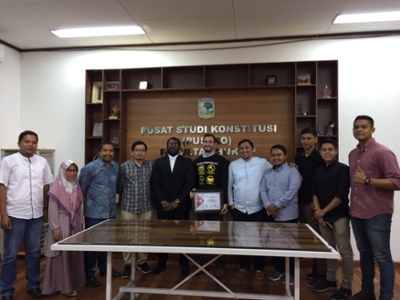Going Home
This will be my final blog post for the summer, as this is my final week in Indonesia. What an incredible journey it has been. All of the friends I made this summer have made this experience wonderful, and I cannot thank them enough. Specifically, Ikhasn Alia has made my time in Indonesia a true cultural experience. From spending two weeks in Bukit Tinggi with his family to simply teaching me about the culture, he has been a true friend. I have been going through the LLM application process with him, and I cannot wait to return the favor when he comes to the U.S. to study.
I would also be remiss not to thank PUSaKO and the Constitutional Court of Indonesia for being gracious hosts and treating me like a V.I.P. the entire summer. PUSaKO even presented me with a framed certificate of completion at the end of my time with them. I have learned more about Indonesian governance, constitutional law, and election law than I ever could have anticipated. Hopefully my article will generate some additional interest in this fascinating country. In my final week, I have been working to perfect my article prior to submitting it for publication. PUSaKO also gave me the opportunity to present my findings to some of the law faculty. This lead to a very interesting conversation about constitutional law in Indonesia, and what “unconstitutional” really means in this civil law country. The conclusion of my article is that the jurisdiction of the local election dispute cases fall into a gray area of constitutionality. While this took me 16 pages to explain in my article, the short version is as follows. The Constitutional Court ruled in 2014 that the jurisdiction should lie with another judicial body. They exercised their constitutional review authority to make this decision, which leads me to the conclusion that they determined that the Constitution dictates that the jurisdiction should be with another judicial authority. PUSaKO, a group of Indonesia constitutional law experts, ague that this does not necessarily mean that the Court’s continued jurisdiction is unconstitutional. They argue that for something to be “unconstitutional” it would have to be an explicit violation of the text of the Constitution, not a Court interpretation of what ought to be. This is vastly different from a U.S. Supreme Court decision, which is granted immediate, binding authority. However, that is the nature of legal authority in Indonesia.

There was no better way to end my time than with a constitutional discussion, and it affirmed my knowledge of Indonesian governance and law. It has been an amazing experience, and I will continue the work necessary to have my article published. For those of you who followed my blogs this summer, thank you for reading!